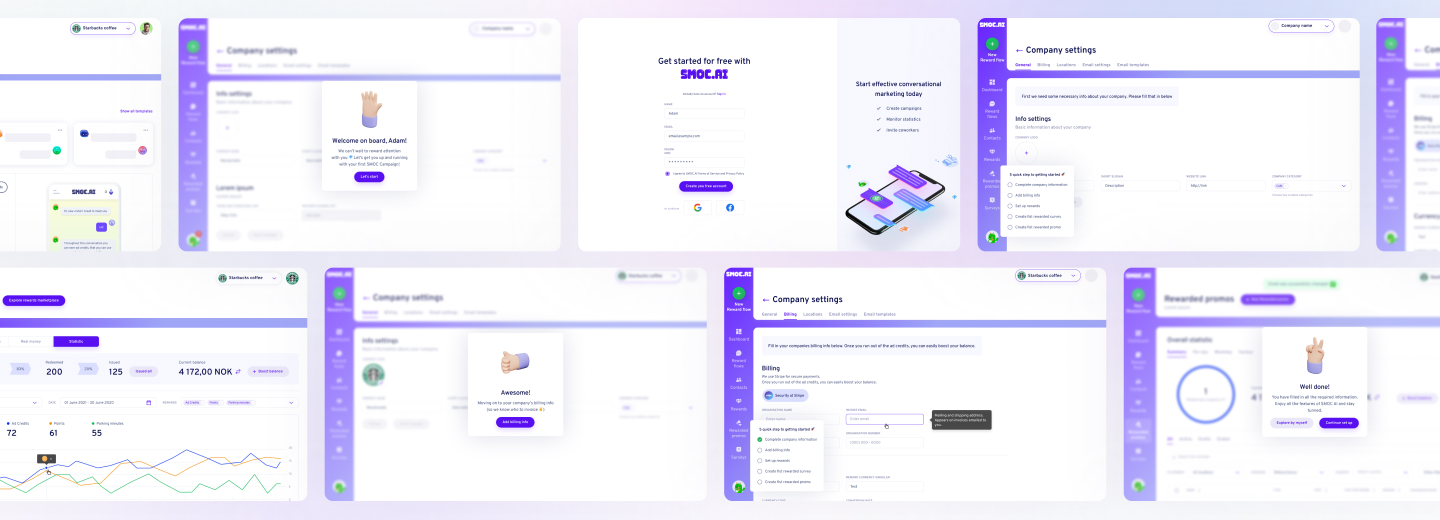Starting a business may sound thrilling, but it also involves continuous challenges, particularly in developing a good relationship with customers. Limited time, resources, and team members make many startups struggle to track leads, manage sales pipeline, and nurture clients. This is where the Customer Relationship Management (CRM) system comes in.
The right CRM, however, is not merely a way to organize contacts, but it can make startups grow much quicker through simplification of communication, automation of processes, and the provision of insights that allow making smarter business decisions. Yet, there are so many solutions in the market, how can you choose the one that best suits the specific requirements of your startup?
This article will explore top CRM software for startups in the market that can suit your new business. We’ll compare their main features, pros, cons, and scalability to get the best CRM software for startups to help you grow.
what’s in the article
- What is a CRM for startups?
- Top 12 CRM Software for Startups
- Why CRM Software is Essential for Startups
- Essential Features of a High-Quality CRM
- How to Pick the Perfect CRM for Your Startup
- Conclusion
What is a CRM for startups?
A CRM Startup is the software used to empower young businesses to better handle and develop their customer relationships. A CRM is not a spreadsheet or disorganized notes, where all information is spread across many papers. Instead, a CRM collects all the information about customers in one place: contacts, interactions, sales opportunities, etc.
This implies that startups do not spend time searching for information and concentrate on their growth. Not only does a good CRM store data, but it also automates follow-ups, keeps a record of conversations, and offers insights on customer behavior. This can enable a small team to work smartly, make the decisions appropriately, and have relationships that are built even in the initial stages.

Looking to Build an MVP without worries about strategy planning?
EVNE Developers is a dedicated software development team with a product mindset.
We’ll be happy to help you turn your idea into life and successfully monetize it.
Top 12 CRM Software for Startups
A good CRM can become the backbone of your startup’s growth and assist you in getting leads, maintaining relationships with customers, and streamlining your sales cycle. However, there are too many choices to make, which can be rather confusing. Here we will list the features, pros, and cons of the 12 best CRM solutions available to startups so you can choose the right one for your business.
1. Salesforce
Salesforce is the world’s leading CRM on the market which is trusted by startups and global enterprises. It provides a comprehensive system of sales and is considered as the best sales CRM for startups, marketing, and customer-service management tools. Its automation and AI are beneficial to startups because it helps teams close deals faster.
Features:
- Flexible dashboards and reports
- Einstein AI-assisted sales forecasting
- Complex automations of processes and lead routing
- Large marketplace of third-party integrations (AppExchange)
- On-the-go teams’ mobile CRM access
Pros:
- Hyper-scalable and expands with your business
- Additional intelligence and predictive analytics
- Allows just about any integration imaginable
- Well-established and popular
Cons:
- Expensive compared to other CRMs
- Complicated installation, high learning curve
- Most of the features hidden behind higher pricing plans
2. HubSpot CRM
HubSpot CRM is an excellent solution for startups that want to start their sales and marketing automation process because of the ease of use and free tier. It’s the best free CRM for startups. It assists in contact management, deal tracking, and integrating with other applications without any issues, so aspirants will find it easy to use.
Features:
- Contact and lead management
- Automation of marketing (emails, workflows, campaigns)
- Deal tracking sales dashboards
- In-line live chat and scheduler of meetings
- The possibility of being integrated with the marketing and service hubs of HubSpot
Pros:
- Simple to operate, perfect for a beginner
- Essential CRM tools for startups are free of charge
- Super integration capabilities with marketing and sales functions
- Besides, a large library of educational resources
Cons:
- Add-on features are costly (advanced features such as predictive lead scoring, goal tracking, and conversation routing)
- The prices increase significantly with scale
3. Keap
Keap is an integrated CRM and marketing solution that is built to serve small business and startups. It assists entrepreneurs to automate their repetitive work as well as deals with management of sales, marketing and payment.
Features:
- Auto-send emails and SMS follow ups
- Integrated billing and payments processing
- Pipeline sales visual management
- Advanced segmentation and contact labeling
- Scheduling of appointments tools
Pros:
- Integrates CRM, marketing and payment tools in a single location
- Good automation makes it time-saving
- Perfect solution to service-based startups
- Superb customer care
Cons:
- Expensive in case of small teams
- Setting up automations learning curve
- Few third-party integrations as Salesforce or HubSpot
4. Pipedrive
A CRM that focuses on sales that has a visual pipeline so that it is easy to monitor the deals. Perfect to startups who desire to have a brief understanding of their sales process. It is quick to implement in a small team since it has minimal setup and is user-friendly.
Features:
- Visually drag and drop pipelines
- Tracking and templates with email syncs
- Robotic sales assistant
- Automated workflow (e.g. sending follow ups)
- Reporting and analytics dashboards
Pros:
- Extremely user-friendly
- Economical to small groups
- excellent for sales-focused startups
- Handy mobile app
Cons:
- Limited marketing and customer contact features
- It is possible to feel basic using reports when compared to sophisticated CRMs
- Less customizable than Salesforce or Zoho
5. Podium CRM
Podium CRM enables the small teams to manage local engagement with their audiences through customer communications arranged across messaging, web, social platforms, online review, and feedback engagement managed in the real-time, all without additional software or the need to organize.
Features:
- SMS, chat, social media messaging centralized
- Review request/management system
- Text-based payments
- Lead management through conversations
- Team chat and collaboration
Pros:
- Great for businesses that rely on reviews and direct messaging
- Easy-to-use interface
- Enhances customer engagement and trust
Cons:
- Expensive when you are a small startup ($249/month min)
- Does not offer such advanced CRM as forecasting or deep analytics
- It would not be applicable in B2B new ventures that require conventional pipelines
6. Zoho CRM
Zoho CRM is very affordable and versatile to startups, and includes sales automation, marketing campaigns, lead management, analytics and integrations into the popular apps enabling them to automate repetitive work, track performance, and scale effectively as businesses grow.
Features:
- Contact and lead management
- Multichannel communication (email, chat, phone, social)
- Automated workflow and sales forecasts using AI
- Refined analytics and reporting
- Custom dashboards and modules
Pros:
- Low-cost and elastic
- Highly customizable
- Solid AI is at the lower levels
- Ideal to international start-ups (multi-languages)
Cons:
- Interface may be cluttered and overwhelming
- There are slow customer support sometimes
- Takes time to be setup in order to use fully
7. SugarCRM
SugarCRM offers a completely customizable platform to technical-enabled startups to automate sales, marketing and customer service, provide advanced workflows, reporting and analytics, allowing the growing businesses to have full control over processes and generate insights to optimize the interaction with customers.
Features:
- High-level workflow and marketing automation
- Sales forecasting based on AI
- The customer support management tools
- Psychological reporting and analytics
- On-premise and clouded deployment possibilities
Pros:
- Extremely flexible and customizable
- Powerful data analytics of expanding startups
- This is a good choice, in certain industries with specific compliance requirements
Cons:
- Pretty expensive compared to others
- There is a steep learning curve to start with
- Interface feels outdated compared to modern CRMs
8. Monday.com
Monday is mostly a project management tool having CRM functionalities. Its capability to track customers and sales pipelines is advantageous to startups since it can be used to collaborate within the teams. It is superb when it comes to teams requiring project and client management within the same tool.
Features:
- Customizable pipelines and workflows
- Dashboards and reporting
- Task and project management software
- Slack, Gmail, Zoom among others integrations
- Repetitive work automation
Pros:
- Very adaptable, personalized
- Integrates project management with CRM
- Easy to use interface, graphics
- Inexpensive discounted plans
Cons:
- The functionality of CRM is not as intense as platforms themselves
- Takes time to customize and set up correctly
- It is daunting because of numerous features
9. Agile CRM
Agile CRM is a feature-rich, affordable, single platform suitable to small startups. Integrates sales, marketing automation, and customer service on one platform so start-ups can streamline without large investment.
Features:
- Lead scoring and contact management
- Automation of marketing (emailing campaigns, landing pages)
- Appointment scheduling
- Helpdesk and ticket system
- Social media integrations
Pros:
- It’s cheap CRM for startups
- Combines sales, marketing and support in one platform
- Suitable to start ups which require extensive functionality at a low fee
Cons:
- Interface is a bit outdated
- Other features are so barebone in comparison to high-end CRMs
- Low support, documentation
10. Insightly CRM
Insightly CRM is a project management-customer relationship management combination. It is best suited to startups that have to work with projects of clients and maintain contacts and deals. Can easily be integrated with G Suite and Office 365.
Features:
- Distribution of lead and pipeline management
- Workflow automation
- Task and project management software
- Connection with Google Workspace, Outlook, and Slack
- Tailored dashboards and reporting
Pros:
- Ideal for startups which do sales and also do projects
- Strong Google and Microsoft integrations
- Grows and scales with businesses
Cons:
- First time user learning curve
- Reporting that is not as sophisticated as Salesforce, for example
- Few marketing features
11. Bitrix24
Bitrix24 is a comprehensive startup tool that provides all the core features of startup CRM, project management, team members collaboration, internal communication and task automation, document sharing in a single application, and is thus easily accessible to economy-driven teams looking to maintain effective internal processes as well as client/customer relationships.
Features:
- Management of the sales pipeline
- In-app chat, video conferencing and teamwork
- Tools of task and project management
- Automation of marketing and customer support
- Cloud or on-premise services
Pros:
- Extremely low cost to larger teams
- CRM + communication + projects 1 integrated platform
- Unlimited user plans on offer
- Versatile deployment capabilities
Cons:
- The interface may be messy and confusing
- Too rich of features to teams that simply require a CRM
- Weak customer services
12. Streak
Streak CRM is directly integrated in Gmail which has enabled startups to manage contacts, track deals, automate email workflows, set reminders, and organize pipelines directly in their inbox which means that email-heavy teams can easily stay organized and follow-up effectively without having to switch tools.
Features:
- Tracking a pipeline directly in Gmail
- Tracking, scheduling, templates of email
- Shared team inbox for collaboration
- Google Workspace integration
Pros:
- Flawless Gmail integration
- No additional software required and is easy to operate
- It works well with sales teams that use email a lot
- Affordable pricing
Cons:
- Supports only Gmail
- Less automation of standalone CRMs
- Does not suit well teams that require extensive analytics or reporting

Proving the Concept for FinTech Startup with a Smart Algorithm for Detecting Subscriptions

Scaling from Prototype into a User-Friendly and Conversational Marketing Platform
CRM Integration
Interested in going to the next level with sales and customer management in your startup? Use the above CRM solutions or create a customized CRM that suits your specific need – EVNE Developers startup consulting service is ready to assist you design and implement an ideal system that will automate your work flow and take your business to the next level today.
Why CRM Software is Essential for Startups
As a startup, each customer touch can make a difference, and as leads, communications and follow-ups begin to pile up, they can get out of hand. The CRM platforms help startups to keep up with more established businesses without increasing headcount by centralizing information and automating routine, repetitive tasks.
Efficient Lead Management to Accelerate Sales Growth
Startups are usually low in resources and it is important to focus on the best leads. Lead management can be simplified with the help of CRM software, which can record all the inquiries, monitor the interactions, and rank prospects by engagement or potential value. This allows sales teams to concentrate their efforts on the most viable opportunities thus closing the deals faster without losing time due to unqualified leads. Teams are able to nurture leads regularly and professionally with automated reminders and pipeline monitoring in place.
Proactive Customer Service and Retention
New customers are important but their retention is also very crucial. The CRMs enable startups to track customer engagement, address their concerns promptly, and deliver customized service. With the full picture of the history, preferences and past concerns of a customer, startups can predict needs, address problems before they become serious, and establish long-term relations that precondition the repetition of business.
Data-Driven Strategic Decision-Making
Startup CRM software helps manage and sort data at all points of the customer experience transforming raw data into useful insights. Through sales, marketing, customer behavior, startups will be able to perform analysis that will help them identify trends, see ahead in revenue, and make better strategic choices. By providing access to real-time dashboards and reports, startups can have an upper hand since the teams will make informed decisions instead of using guesswork.
Scalable Tools to Support Rapid Market Expansion
Indeed, startups that grow at a high rate require systems that can scale alongside. The contemporary CRMs are scalable, providing automation of the routine tasks to incorporation of the new ones as the business needs grow. It does not matter whether the organization is moving into new markets, growing in size, or offering new lines of products, a CRM offers the framework and flexibility to manage growth without operational mess.
Essential Features of a High-Quality CRM
A CRM database of contacts is not the only thing a high-quality CRM can offer; instead, such a tool plays a central role in the process of the company organization of relationships, simplification of the business process, and decision-making. In the case of startups, the selection or rather the right kind of features in a CRM can make a huge difference to productivity, customer satisfaction, and the potential growth. The following are the necessary capabilities that a good CRM must provide.
Contact & Lead Management
Any CRM is based on the fact that it allows organizing contacts and tracking leads. The effective CRM will enable the startups to measure the interactions, customer segmentation and the progress of every lead down the sales pipeline. With all information centralized, including emails and calls, meeting notes, and so on, teams can guarantee that no opportunity is missed and follow-ups occur in a timely manner, as a result, increasing conversion rates and building stronger relationships.
Automation & Workflow Management
The major difference between a simple contact list and a CRM is automation. Top CRM platforms for startups are able to automate tasks that are redundant such as follow up emails, leads to members within a team or updating deal stages. Tools that manage workflow can also make process simpler, minimize human error and allow teams to concentrate on value-added tasks, guaranteeing that startup remains efficient despite their resource constraints.
Analytics & Reporting
The power in CRM is the ability to transform raw data into meaningful instructions. Analytics and reporting capabilities will enable startups to monitor the sales performance, measure marketing campaigns and customer behaviour. Teams can drive decisions based on data and be able to forecast their revenue and pinpoint areas that require attention using customizable dashboards and real-time reporting, which gives startups an advantage in the competitive landscape.
Integrations & Scalability
An excellent CRM must not exist in isolation – it has to integrate and blend well with other business tools including email systems, marketing solutions, and project management applications. Scalability also matters, so that the CRM software can support a larger number of users, a larger amount of data, and more complex workflow as the startup expands without compromising performance. This adaptability enables the companies to grow with certainty and keep the processes in order.

Need Checking What Your Product Market is Able to Offer?
EVNE Developers is a dedicated software development team with a product mindset.
We’ll be happy to help you turn your idea into life and successfully monetize it.
How to Pick the Perfect CRM for Your Startup
The proper selection of CRM can save the efficiency of how your startup will handle customer relations, stimulate sales, and grow significantly. So many solutions are available on the market; therefore, it is necessary to consider solutions and to make sure that they fit your startup now and in the future. Concentrating on the appropriate criteria will enable you to choose a CRM which can effectively help your business.
Choosing the right CRM can make a huge difference in how efficiently your startup manages customer relationships, drives sales, and scales operations. With so many options on the market, it’s important to evaluate solutions carefully to ensure they match your startup’s current needs and future growth. Focusing on the right criteria will help you select a CRM that truly supports your business.
Defining Your Goals
Prior to considering the CRM alternatives, it is imperative to explain what your startup aims to accomplish. Do you want to focus on how you manage leads or customer service or automate marketing campaigns? The establishment of clear objectives will help you focus on the features that are most significant and do not spend any money on features that are not required. Being aware of your goals, you can also more easily measure how successful the CRM will be once implemented.
Selecting Key Features
Not all CRM systems for startups will serve your intentions equally, and the one that will suit you should provide you with such features that can be aligned with your intentions. Key capabilities can comprise contact and lead management, automation of workflow, reporting dashboards, and communicative tracking. The startups need also to take into account such specialized tools as email marketing, social media, or customer support management so that the platform could facilitate the day-to-day operations.
Ensuring Ease of Use and Reliable Support
An effective CRM system for startups is ineffective even when it is powerful but your staff cannot use it well. Seek user friendly interfaces, easy installation procedures and tutorials and manuals. Stable customer service is also critical- efficient and intelligent assistance can avoid possible delays, particularly during onboarding, and make your staff efficient as of day one.
Choosing Scalable Solutions with Strong Integrations
A CRM must scale with your startup, to accommodate a growing customer base, and new staff. Scalability protects against the fact that, as your business grows, the CRM has to support increasing numbers of users, more sophisticated workflows and bigger data. Integrations with other business solutions such as email, accounting tools or project management frameworks that enable us to fully streamline the flow of data and minimize friction in operation are also important.
Conclusion
To choose the right CRM is one of the most critical choices any startup has to make because it directly affects relations with customers and their leads and the overall development. The best CRM for startups must match your startups expectations, offer the basic functionalities such as automation and analytics and be able to scale to accommodate growth.
Through keen consideration of the ease of use, integrations, and cost, startups are able to choose a solution which not only helps organize operations but also expedites sales and improves customer satisfaction. When investing in the correct CRM at the earliest stage, the basis of the long-term efficiency, more intelligent decision-making, and sustainable growth is established.
Setup generally requires 12 to 48 hours of set-up time, up to a few weeks in case of more customized platforms and data migrations.
The vast majority of CRMs provide tutorials, knowledge bases, webinars and live support. Dedicated customer success managers or onboarding is usually covered in paid plans.
There are challenges like data migration, adoption among the team members, selection of functionality and fitting workflows to business objectives.
Some are free plans with limited features, and others cost $15 – 50 a month per person; higher-end CRMs can cost much more still.
Popular among them are HubSpot CRM (free plan), Zoho CRM, and Pipedrive, and have the essential features at low or no costs.

About author
Roman Bondarenko is the CEO of EVNE Developers. He is an expert in software development and technological entrepreneurship and has 10+years of experience in digital transformation consulting in Healthcare, FinTech, Supply Chain and Logistics.
Author | CEO EVNE Developers


















